223 scholarly books by University of London Press and 15
start with M
223 scholarly books by University of London Press and 15
223 scholarly books by University of London Press
15 start with M start with M
15 start with M start with M

Magna Carta
history, context and influence: Papers delivered at Peking University on the 800th anniversary of Magna Carta
Edited by Lawrence Goldman
University of London Press, 2018
This book examines the history and influence of Magna Carta in British and American history. In a series of essays written by notable British specialists, it considers the origins of the document in the political and religious contexts of the thirteenth century, the relevance of its principles to the seventeenth century disputes that led to the Civil War, the uses made of Magna Carta to justify the American Revolution, and its inspiration of the radical-democratic movement in Britain in the early nineteenth century. The introductory essay considers the celebration of Magna Carta's 800th anniversary in 2015 in relation to ceremonials and remembrance in Britain in general. Given as papers to a joint conference of British and Chinese historians in Beijing in 2015, these essays provide a clear and insightful overview of the origins and impact of a medieval document that has shaped the history of the world. The open access edition of this book can be found at http://humanities-digital-library.org/index.php/hdl/catalog/book/goldman.
[more]

Making Institutions Work in Peru
Democracy, Development and Inequality Since 1980
Edited by John Crabtree
University of London Press, 2006

Making Sense of the Census Revisited
Census Records for England and Wales,1801-1901. A Handbook for Historical Researchers
Edward Higgs
University of London Press, 2005
This book, published jointly by the Institute of Historical Research and The National Archives, updates the earlier work, 'A Clearer Sense of the Census' (1996). It now includes material relating to the recently released 1901 census returns and to the pre-1841 censuses. It includes details of the structure and geography of the census, and has comprehensive information on the houses, households, individuals and occupations that appear in the returns. There are also chapters on using the censuses, the skills required (and how you acquire them), and the various reference tools and finding aids available, online and in print. This is an invaluable guide to an important source for the history of the 19th century. 'This is an invaluable and very welcome book. It will be widely used for reference and in teaching. No-one should use the printed or manuscript records with any seriousness without having a copy' R J Morris (Edinburgh University) The author, Edward Higgs, is Reader in History at the University of Essex.
[more]
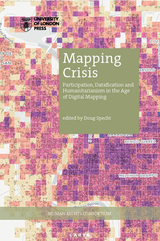
Mapping Crisis
Participation, Datafication and Humanitarianism in the Age of Digital Mapping
Edited by Doug Specht
University of London Press, 2020
The digital age throws questions of representation, participation, and humanitarianism back to the fore, as machine learning, algorithms, and big data centers take over the process of mapping the subjugated and subaltern. Mapping Crisis questions whether it is the map itself that is in crisis. This book brings together critical perspectives on the role that mapping people, knowledges, and data now plays in humanitarian work, both in cartographic terms and through data visualizations. Since the rise of Google Earth in 2005, there has been an explosion in the use of mapping tools to quantify and assess the needs of the poor, including those affected by climate change and the wider neo-liberal agenda. Yet, while there has been a huge upsurge in the data produced around these issues, the representation of people remains questionable. Some have argued that representation has diminished as people are increasingly reduced to data points. In turn, this data has become ever more difficult to analyze without vast computing power, leading to a dependency on the old colonial powers to refine the data of the poor, before selling it back to them.
[more]
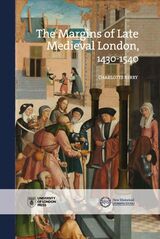
The Margins of Late Medieval London, 1430–1540
Charlotte Berry
University of London Press, 2022
A powerful study of medieval London’s urban fringe.
The Margins of Late Medieval London seeks to unpack the complexity of urban life in the medieval age, offering a detailed and novel approach to understanding London beyond its grand institutions and social bodies. Using a combination of experimental digital, quantitative, and qualitative methodologies, the volume casts new light on urban life at the level of the neighborhood and considers the differences in economy, society, and sociability which existed in different areas of a vibrant premodern city. This book focuses on the dynamism and mobility that shaped city life, integrating the experiences of London’s poor and migrant communities and how they found their place within urban life. It describes how people found themselves marginalized in the city, and the strategies they would employ to mitigate that precarious position.
The Margins of Late Medieval London seeks to unpack the complexity of urban life in the medieval age, offering a detailed and novel approach to understanding London beyond its grand institutions and social bodies. Using a combination of experimental digital, quantitative, and qualitative methodologies, the volume casts new light on urban life at the level of the neighborhood and considers the differences in economy, society, and sociability which existed in different areas of a vibrant premodern city. This book focuses on the dynamism and mobility that shaped city life, integrating the experiences of London’s poor and migrant communities and how they found their place within urban life. It describes how people found themselves marginalized in the city, and the strategies they would employ to mitigate that precarious position.
[more]
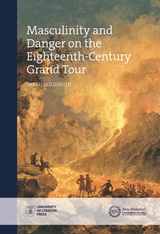
Masculinity and Danger on the Eighteenth-Century Grand Tour
Sarah Goldsmith
University of London Press, 2020
The Grand Tour, a customary trip through Europe undertaken by British nobility and wealthy landed gentry during the seventeenth and eighteenth centuries, played an important role in the formation of contemporary notions of elite masculinity. Through an examination of testimonies written by Grand Tourists, tutors, and their families, Sarah Goldsmith argues that the Grand Tour educated young men in a wide variety of skills, virtues, and vices that extended well beyond polite society.
Goldsmith demonstrates that the Grand Tour was a means of constructing Britain’s next generation of leaders. Influenced by aristocratic concepts of honor and inspired by military-style leadership, elite society viewed experiences of danger and hardship as powerfully transformative and therefore as central to constructing masculinity. Scaling mountains, volcanoes, and glaciers, and even encountering war and disease, Grand Tourists willingly tackled a variety of perils. Through her study of these dangers, Goldsmith offers a bold revision of eighteenth-century elite masculine culture and the critical role the Grand Tour played within it.
Goldsmith demonstrates that the Grand Tour was a means of constructing Britain’s next generation of leaders. Influenced by aristocratic concepts of honor and inspired by military-style leadership, elite society viewed experiences of danger and hardship as powerfully transformative and therefore as central to constructing masculinity. Scaling mountains, volcanoes, and glaciers, and even encountering war and disease, Grand Tourists willingly tackled a variety of perils. Through her study of these dangers, Goldsmith offers a bold revision of eighteenth-century elite masculine culture and the critical role the Grand Tour played within it.
[more]
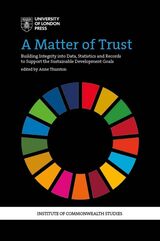
A Matter of Trust
Building Integrity into Data, Statistics and Records to Support the Sustainable Development Goals
Edited by Anne Thurston
University of London Press, 2020
The United Nations Sustainable Development Goals initiative has the potential to set the direction for a future world that works for everyone. Approved by 193 United Nations member countries in September 2016 to help guide global and national development policies through the year 2030, the seventeen goals build on the successes of the Millennium Development Goals, but also include new priority areas, such as climate change, economic inequality, innovation, sustainable consumption, peace, and justice. Assessed against commonly agreed targets and indicators, the goals should facilitate inter-governmental cooperation and the development of regional and even global development strategies. This book explores, through a series of case studies, the substantial challenges for assembling reliable data and statistics to address pressing development challenges, particularly in Africa. By highlighting the enormous potential value of creating and using high quality data, statistics, and records as an interconnected resource and describing how this can be achieved, the book will contribute to defining meaningful and realistic global and national development policies in the critical period to 2030.
[more]
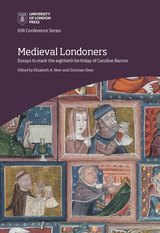
Medieval Londoners
essays to mark the eightieth birthday of Caroline M. Barron
Edited by Christian Steer and Elizabeth New
University of London Press, 2019
Medieval Londoners were a diverse group, some born in the city, and others drawn to the capital from across the realm and from overseas. For some, London became the sole focus of their lives, while others retained or developed networks and loyalties that spread far and wide. The rich evidence for the medieval city, including archaeological and documentary evidence, means that the study of London and its inhabitants remains a vibrant field. Medieval Londoners brings together archaeologists, historians, art-historians and literary scholars whose essays provide glimpses of medieval Londoners in all their variety. This volume is offered to Caroline M. Barron, Emeritus Professor of the History of London at Royal Holloway, University of London, on the occasion of her 80th birthday. Her remarkable career – over some fifty years – has revitalized the way in which we consider London and its people. This volume is a tribute to her scholarship and her friendship and encouragement to others. It is thanks to Caroline M. Barron that the study of medieval London remains as vibrant today as it has ever been.
[more]

Medieval Merchants and Money
Essays in Honour of James L. Bolton
Edited by Matthew Davies
University of London Press, 2016
This volume contains selected essays in celebration of the scholarship of the medieval historian Professor James L. Bolton. The essays address a number of different questions in medieval economic and social history, as the volume looks at the activities of merchants, their trade, legal interactions and identities, and on the importance of money and credit in the rural and urban economies. Other essays look more widely at patterns of immigration to London, trade and royal policy, and the role that merchants played in the Hundred Years War.
[more]
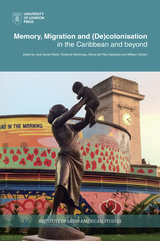
Memory, migration and (de)colonisation in the Caribbean and beyond
Edited by Jack Daniel Webb, Roderick Westmaas, Maria del Pilar Kaladeen, and William Tantam
University of London Press, 2019
In recent years, academics, policy makers and media outlets have increasingly recognised the importance of Caribbean migrations and migrants to the histories and cultures of countries across the Northern Atlantic. Memory, migration and (de)colonisation furthers our understanding of the lives of many of these migrants, and the contexts through which they lived and continue to live. In particular, it focuses on the relationship between Caribbean migrants and processes of decolonisation. The chapters in this book range across disciplines and time periods to present a vibrant understanding of the ever-changing interactions between Caribbean peoples and colonialism as they migrated within and between colonial contexts. At the heart of this book are the voices of Caribbean migrants themselves, whose critical reflections on their experiences of migration and decolonisation are interwoven with the essays of academics and activists.
[more]
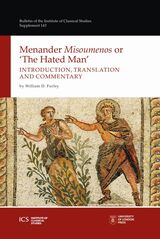
Menander "Misoumenos" or "The Hated Man"
Introduction, Translation, and Commentary
William Furley
University of London Press, 2021
Based on recently discovered fragments, this is one of the most complete English-language publications of Misoumenos, or The Hated Man.
Menander’s Misoumenos, or The Hated Man, is one of his most popular plays to have survived from classical times. Dating to approximately 300 BCE, it tells the story of a mercenary soldier and the captive girl he acquires while on campaign in Cyprus. The play follows the soldier’s growing despair as the girl spurns his advances and slowly turns against him, culminating in his suicidal thoughts.
The play belongs to the ancient genre of New Comedy, of which Menander was the acknowledged master. This edition presents a significantly updated text and the fullest English language translation of the play to date. It aims to restore as much as possible of the action of Misoumenos, reconstructing the language, stagecraft, and theatrical dialogue of the original based on hypothesis and reconstruction. Some sections can be restored nearly in full, permitting access to brilliantly original theatrical dialogue which had been lost for over two millennia. Apart from meter and sophisticated idiom, the themes of love, despair, and sadness that Menander treats are utterly timeless.
Menander’s Misoumenos, or The Hated Man, is one of his most popular plays to have survived from classical times. Dating to approximately 300 BCE, it tells the story of a mercenary soldier and the captive girl he acquires while on campaign in Cyprus. The play follows the soldier’s growing despair as the girl spurns his advances and slowly turns against him, culminating in his suicidal thoughts.
The play belongs to the ancient genre of New Comedy, of which Menander was the acknowledged master. This edition presents a significantly updated text and the fullest English language translation of the play to date. It aims to restore as much as possible of the action of Misoumenos, reconstructing the language, stagecraft, and theatrical dialogue of the original based on hypothesis and reconstruction. Some sections can be restored nearly in full, permitting access to brilliantly original theatrical dialogue which had been lost for over two millennia. Apart from meter and sophisticated idiom, the themes of love, despair, and sadness that Menander treats are utterly timeless.
[more]

Menander 'Perikeiromene' or 'The Shorn Head'
Edited by William D. Furley
University of London Press, 2015
Menander set Perikeiromene, or the ‘Woman with shorn head’ in Corinth, famous for its beautiful women, at a time when the city's troubles were at their height owing to the Macedonian conquest of Greece. The story reflects in miniature some of the turbulence of the times. A mercenary soldier Polemon returns home from service to discover, as he thinks, that his girl, Glykera, has found another lover. In a fit of jealous rage he shears off her hair and goes off to drown his sorrows with companions. Glykera promptly moves out from Polemon's house to the neighbour's house, in which her purported new lover Moschion lives. But all is not as it seems... Typically for the genre of New Comedy, Menander takes his characters to the brink in this lively drama before the recognitions which set everything straight. Discoveries of fragmented manuscripts of this play in the twentieth century have more or less brought it back to life.
[more]

Mexican Foreign Policy at the Turn of the Twenty-first Century
How Domestic a Foreign Policy?
Ana Covarrubias
University of London Press, 2005

Mexican Soundings
Essays in Honour of David A. Brading
Edited by Susan Deans-Smith and Eric Van Young
University of London Press, 2007

mit worten lûter unde glanz
Metapoetics in Konrad von Würzburg’s Trojanerkrieg
Esther Laufer
University of London Press, 2016
How can you fathom a bottomless abyss? How can you capture ineffable beauty in words? How do you narrate the master of all stories? These are the challenges that seasoned poet Konrad von Würzburg set himself when at the end of the 13th century he composed his account of the Trojan War from a multitude of sources. Konrad has long been recognized as an exceptionally self-conscious author who frequently reflects on the nature, status and function of poetry, and who at times appears more concerned with the sparkling surface of his discourse than with the events he narrates. Taking these observations as a starting point, this study presents the first comprehensive treatment of metapoetics in the Trojanerkrieg. Focusing on traditional and often discussed loci of metapoetic significance, it also uncovers the far-reaching network of explicit and implicit metapoetic expression that permeates the text on every level - even though its multifaceted imagery and arguments resist translation into the language of formal literary theory. The fact that Konrad’s metapoetic vocabulary regularly draws on imagery of religious origin offers a new perspective from which to address the controversial question of the Christian author’s attitude towards the pagan splendour of the narrated world. In highlighting the pitfalls of metapoetic interpretation and mapping out possible conceptualizations of textuality, language and poetry in Middle High German poetry as well as the relationship between secular and religious literature, this study also makes a broader contribution to medieval literary studies.
[more]
READERS
Browse our collection.
PUBLISHERS
See BiblioVault's publisher services.
STUDENT SERVICES
Files for college accessibility offices.
UChicago Accessibility Resources
home | accessibility | search | about | contact us
BiblioVault ® 2001 - 2024
The University of Chicago Press









